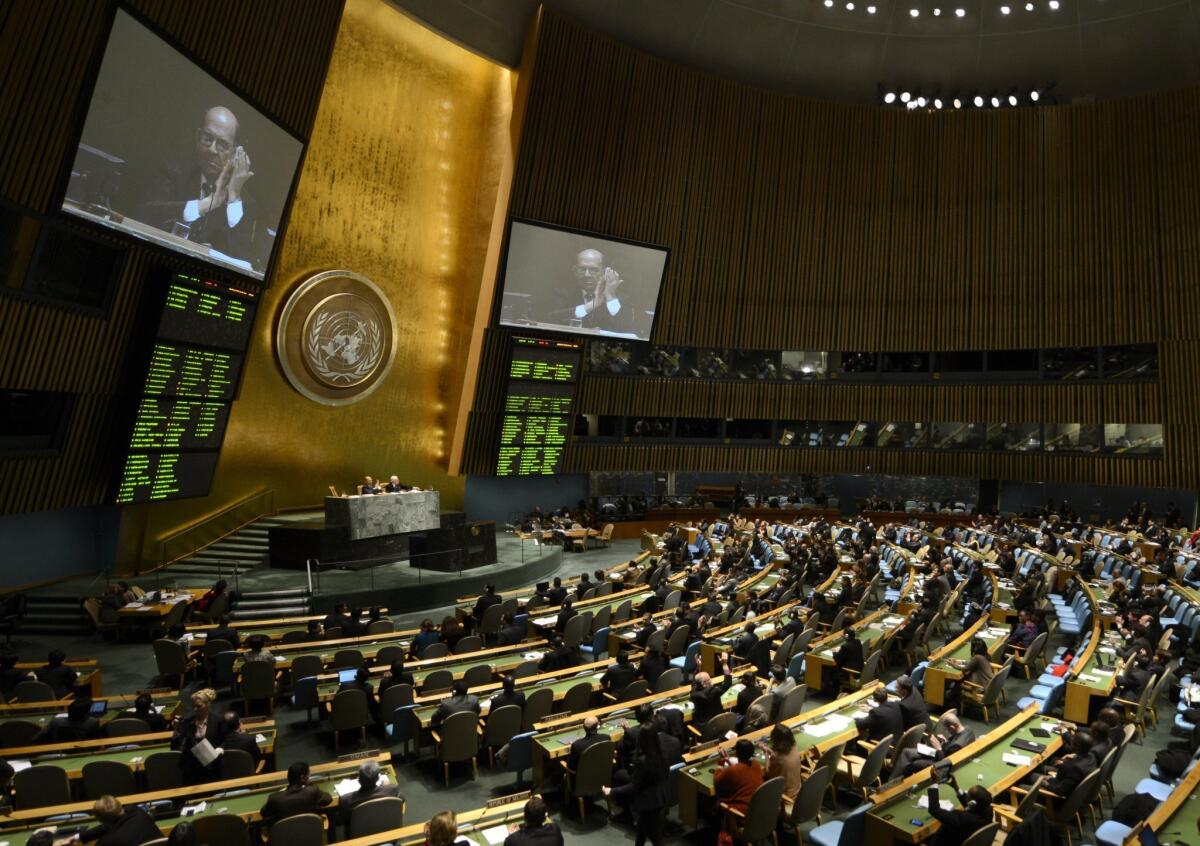Power of global arms treaty hinges on next steps, activists say

- Share via
A new United Nations pact to regulate the global weapons trade was cheered by human rights and humanitarian groups, but its power will depend on how stringently it is followed.
Like many international agreements, the arms trade treaty does not have a strict system of enforcement. The three countries that opposed it — Iran, North Korea and Syria — will simply not follow it.
Other countries may go on to sign and ratify the agreement, yet bend or break its rules. To put it into place, countries will also need to pass national laws to regulate and track weapons exports. To skirt the agreement, nations could pass laws that are weak or never enforced.
Nonetheless, human rights activists say the new pact, which requires countries to regulate the arms trade and weigh whether transferring weapons will lead to rights violations, terrorism and other abuses, will help them hold countries accountable.
The power of the agreement is that it stigmatizes sending weapons to abusers and becomes common ground for future action, said Raymond C. Offenheiser, president of the international relief organization Oxfam America.
“What you have is a starting point,” Offenheiser told reporters on a conference call Tuesday.
Shipping weapons to known abusers will be illegal rather than merely “irresponsible,” throwing legal weight behind their campaigns, activists say. The U.N. Security Council is more likely to act when international pacts are trampled, Amnesty International USA deputy executive director Frank Jannuzi said. Rights groups could also try to shame regional groups such as the African Union into action.
The groundbreaking agreement also requires countries to issue annual reports on arms transfers, a crucial new tool for activists trying to track the weapons trade and shame countries who arm abusers.
If countries claim they are exporting their weapons to specific countries and their products show up somewhere else, “we’ll know there’s a problem,” said Daryl Kimball, executive director of the U.S.-based Arms Control Assn.
Like Offenheiser, Jannuzi noted that the agreement still meant much work ahead. Human rights groups will need to monitor whether countries that voted for the agreement actually move ahead with signing and ratifying it — steps needed to put the pact into effect. Kimball estimated that the minimum number of countries needed to ratify would do so within a year or two.
In the U.S., the National Rifle Assn. has opposed the arms trade treaty and urged lawmakers not to ratify it. A Heritage Foundation fellow argued it was “a no-win game for the United States” because only “law-abiding states” would follow it.
Among the three countries opposing the treaty, the U.N. Security Council has already imposed arms embargoes on Iran and North Korea over their nuclear programs; the European Union and the Arab League have imposed arms embargoes on Syria for alleged abuses during its ongoing war.
However, even if the U.S. doesn’t ultimately ratify the agreement, arms control groups say the U.S. is already largely in compliance with its rules. Though activists are pressing the U.S. to join because of its global influence, concrete change will depend more heavily on ratification and new regulations for countries that now lack them.
Besides the three countries that opposed the treaty, nearly two dozen countries abstained from Tuesday’s vote on the pact, including major weapons exporters Russia and China. Kimball and other activists said it was still possible that those countries could be swayed to join in the future.
Once countries sign on, Amnesty International and other human rights groups will eye the national laws they pass to see that they establish rigorous controls on exporting weapons, and monitor whether they follow them.
“It’s not a panacea,” Jannuzi said. “But we do think it’s a significant step in the right direction.”
ALSO:
Jobless rate hits new record in Eurozone
Death of Palestinian prisoner in Israel sparks violence
North Korea analyst: ‘One of the most dangerous moments’
More to Read
Sign up for Essential California
The most important California stories and recommendations in your inbox every morning.
You may occasionally receive promotional content from the Los Angeles Times.













